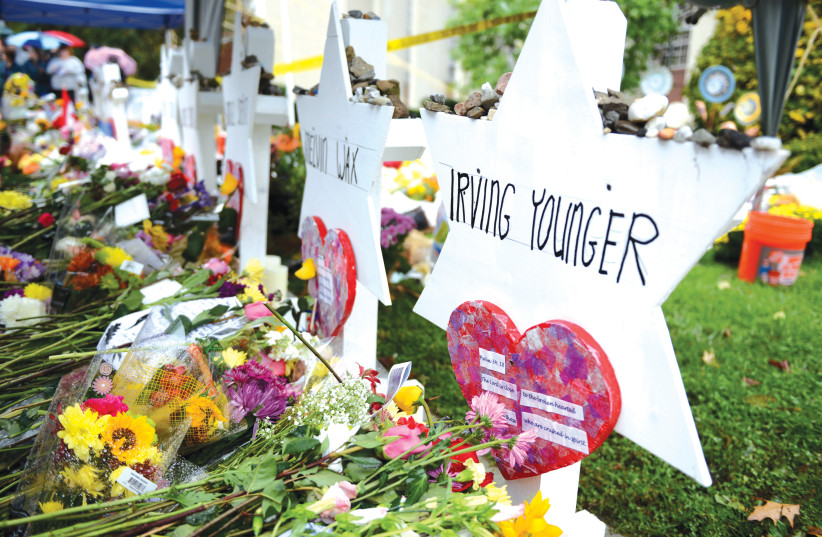International Holocaust Remembrance Day has not yet taken root in Israel. After all, Israel already has a Holocaust Martyrs’ and Heroes’ Remembrance Day. This makes today’s observance an important, yet secondary occasion for Israelis.
Nevertheless, Israelis shouldn’t overlook International Holocaust Remembrance Day. It is a significant opportunity to not only remember the past but also to fight contemporary antisemitism. If on the 27th of Nissan we commemorate the 6 million Jews who were murdered in the Holocaust, the 27th of January is an opportunity for Israelis to turn the spotlight to this very moment in time, to contemporary antisemitism and the state of world Jewry.
It is also an opportunity to acknowledge that Israel’s attitude toward global antisemitism is somewhat confusing. Israelis are disconnected from the daily experience of Jews around the world, for whom antisemitism is an everyday struggle.
Just this month, an armed man took four people, including a rabbi, hostage at a synagogue in Colleyville, Texas. It brought to mind the 2018 massacre at the Tree of Life synagogue in Pittsburgh, which claimed the lives of 11 worshippers, including Holocaust survivors. It was the deadliest antisemitic attack in US history.
Sometimes antisemitism is associated, as it was in the case of the Pittsburgh tragedy, with xenophobia or white supremacy, bundled up with racism, homophobia or misogyny. At other times, antisemitism is attributed to tensions surrounding the State of Israel and tends to rise dramatically during Israeli military operations, like it did in May 2021.

All the while, traditional antisemitism hasn’t disappeared from the world. In times of economic crisis, there have, and always will be, those who see Jews as an all-powerful octopus wielding a tentacle-like grip on the banking system, the media, the government and more. Since many of those on the frontlines in the war against the coronavirus are Jews, there are sick minds who pin the plague on Jews.
David Bateman, founder of the Entrata software company and once a prominent figure in Utah Republican politics, recently inundated public figures with letters claiming that the COVID-19 vaccine is part of a “Jewish conspiracy.”
Comparisons between vaccines and Nazi crimes are ubiquitous, a new kind of opportunistic and outlandish antisemitism. Yet for Jews around the world, it doesn’t matter if the perpetrator is a Christian or a Muslim, or what passed through their troubled mind.
All variants of antisemitism lead to the same negative outcome: Jews’ feelings of safety and security being undermined, their fear of leaving the house wearing Jewish symbols swelling, and other behavioral changes as fear increasingly take hold. Ensuing senses of helplessness, sadness, and frustration also follow.
AND YET, apart from empty speeches, Israel could do more for Jews around the world. Understandably, Israelis have become immersed in problems of their own, but antisemitism is very much alive and a growing threat. According to a new survey we commissioned at the Ruderman Family Foundation, 94% of American Jews say they witnessed at least some antisemitism in the US over the past five years.
The years 2019 and 2020 were the highest years on record for antisemitic incidents in the US. Still, it is difficult for an Israeli to even imagine feeling wary about donning a kippah in the morning or hesitating about taking the kids to a gym class at the Jewish community center. The truth is that Israelis have forgotten what it is like to be a minority. Some Israeli politicians are even willing to flirt with dubious neo-Nazi right-wing parties in Europe, just because they touch on some common interests.
We believe that just as world Jewry – and of course the Jewish community in the US – are vital to Israel’s economy, resilience, and even survival, it is our duty to do everything we can to ensure the safety of every Jew around the world. The approach of urging Jews living in conflict and crisis zones to make aliyah is misguided. Jews have the right to safety and well-being wherever they choose to live.
Immigrating to Israel is a tremendous privilege, but you can be Jewish without coming to live in Israel. In fact, the vision of Israel as a Jewish spiritual center, as proposed by the pre-state Zionist thinker Ahad Ha’am, is a more relevant path for modeling the relationship between Israel and global Jewish communities. But the question is whether, in 2022, Israelis care about world Jewry at all. In our opinion, they do, but not enough.
On this International Holocaust Remembrance Day, we suggest taking a moment to think about Jews living around the world and the ways to eradicate contemporary antisemitism. It is worth adding to the day’s special events in the Knesset, media coverage, film screenings, and educational activities, an emphasis on combating contemporary antisemitism and strengthening Israel’s connection to world Jewry.
One example is the Israeli initiative to counter Holocaust denial, which was passed about a week ago at the UN – which, given the world body’s chronic bias against Israel, prompted many to feel as if they should recite the Shehechiyanu vekiymanu blessing for new and unusual experiences.
It is a pity that we in Israel all too often miss out on the opportunity to unite with the world in remembering the disaster that befell the Jewish people. If on this day we also remember Jewish communities abroad and their challenges, millions of other Jews worldwide will also be able to say, Shehechiyanu vekiymanu.
Shira Ruderman is executive director of the Ruderman Family Foundation. Jay Ruderman is the foundation’s president.
